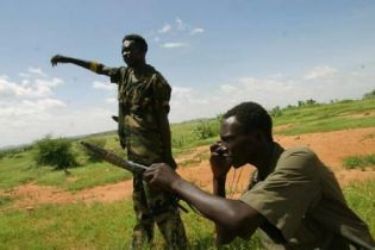JEM rebels reject the proposed peace deal saying it remains far from Darfur’s aspirations
May 1, 2011 (DOHA) — The rebel Justice and Equality Movement (JEM) rejected a draft peace agreement to end the eight year conflict in western Sudan region of Darfur saying it remains far from the legitimate aspirations of Darfurians.

JEM rebels warned they are not concerned by the accords proposed by the mediation stressing they are negotiated by the government and Liberation and Equality Movement (LJM). The talks, they said, should be based on the discussion-papers prepared by the two parties.
Delegations from the two sides met on Saturday and Sunday — with the presence of the US Senior Adviser for Darfur Dane Smith — to discuss a number of topics according to an agenda scheduled by the mediation. Prioritizing the easy issues, the mediators preferred to start with the Human Rights Fundamental Freedoms chapter.
“We believe that our positions are radically different and there is an obvious lack of common grounds with the government, JEM spokesperson Gibreel Adam Bilal told Sudan Tribune. He further said the government delegation tirelessly referred to the draft peace agreement in the discussions.
He said the government refused to discuss a number of points related to the public freedoms as the freedom of expression or assembly, the press law, the state of emergency law and the national security law.
“They rejected any discussion saying talks should focus on issues related to Darfur, but these laws are also enforced in Darfur,” he wondered.
Gibreel further said the his groups demanded to establish a human rights commission agreed in the Comprehensive Peace Agreement in 2005 but never set up due to the differences between the National Congress Party and the SPLM.
The US envoy to Sudan Princeton Lyman urged the Sudanese parties to hold serious discussions in Doha in order to reach a comprehensive peace agreement. He also said it would be important to have the leader of the rebel group Khalil Ibrahim in Doha. But added that it might be difficult for him to leave Libya currently.
He also stressed that the settlement of Darfur crisis is crucial for the normalization of the bilateral relations and the lift of economic sanctions. Observers say Washington is aware of the need to ease sanctions and to allow Khartoum to get the support of international institutions.
Gibreel said the draft agreement does not bring suitable solutions to the causes or the consequences of the conflict in Darfur. He cited the administrative status, the compensations and security arrangements.
Asked to elaborate on JEM position over the administrative status, the rebel spokesperson said the draft agreement maintains the three administrative levels of power (local authority, state and central governments) in Darfur, and the three states in the region depends directly from the central government.
“But we want the Government of Darfur which will represent the whole region at the national level. The fourth level should be clearly established,” he added.
In Khartoum, the vice-president Ali Osman Taha today discussed with the presidential adviser tasked with Darfur file, Ghazi Salah Al-Deen, the ongoing works to review the territorial administrative reshaping of South and West Darfur states in order to create two additional states in Bahr Al-Arab and Zalingei.
JEM official termed as insufficient the 250 USD allocated, in the draft agreement, to every affected family as individual compensation. He added that this figure is not a faire or equitable compensation.
He said JEM demands to define the notion of family and proposes to augment the compensation.
“The polygamy in Darfur implies to distinguish between the small family, up to 7 member, and the big family, 7 to 30 members. So we propose to augment the compensation allotted to the small family to 1500 USD and to give 3000 USD to the big family,” he said
LJM top negotiator Tadjadine Bechir Niam, said the acceptance of the individual compensation by the Sudanese government is a big achievement in the draft peace agreement discussed in Doha. The government refused during Abuja peace process to include this measure in the peace agreement signed with Minni Minnawi in May 2006.
Minnawi, now returned rebel, accuses Khartoum of non-implementation of the peace agreement citing among others the security arrangements and the integration of his commanders in the Sudanese army.
Niam said yesterday that the draft agreement stipulates clearly the integration of the rebel commanders in the Sudanese army as high ranking officers.
Gibreel however said JEM wants to preserve intact the rebel troops during the interim period and not disband and or to integrate the national army immediately after the signing of the agreement.
He justified this position by the need to enhance their capacities before to integrate the Sudan Armed Forces (SAF) which will oblige them to retreat after the end of the interim period when they fail in the regular tests they have to perform.
“At the end of the interim period they will ignite a new rebellion,” he said.
Lyman underlined in Doha, the need to integrate the two SLM groups led by Minni Minnawi and Abdel Wahid Al-Nur to the Doha peace process in order to have a viable peace agreement.
Gibreel said underlined that JEM has thousand of rebel combatants based in Kordofan region, and the government refuse to discuss anything about them saying the Doha foprum is for Darfur conflict only.
“So what we will do for their them,” he asked.
(ST)
